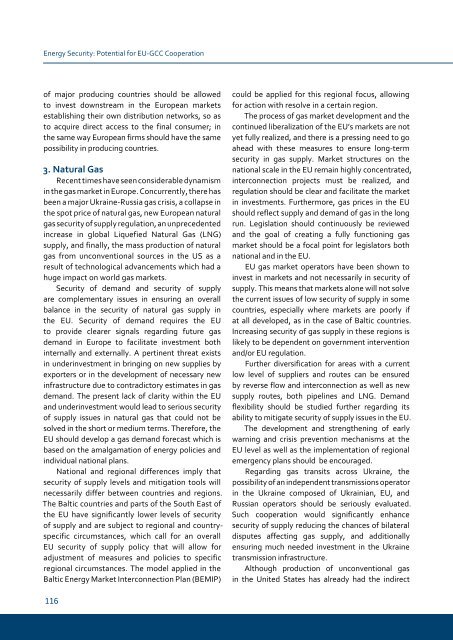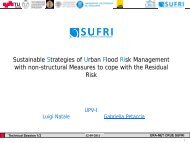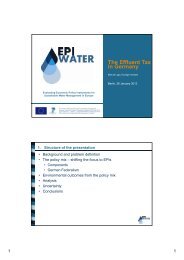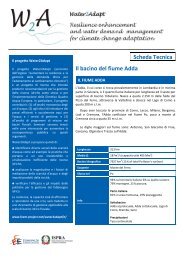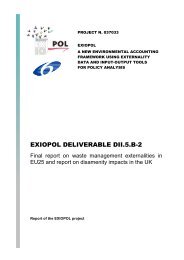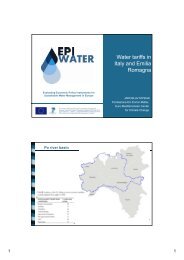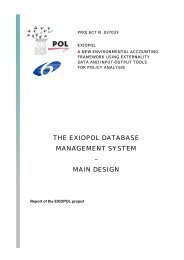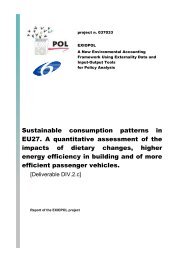Gulf and European Energy Supply Security - Feem-project.net
Gulf and European Energy Supply Security - Feem-project.net
Gulf and European Energy Supply Security - Feem-project.net
You also want an ePaper? Increase the reach of your titles
YUMPU automatically turns print PDFs into web optimized ePapers that Google loves.
<strong>Energy</strong> <strong>Security</strong>: Potential for EU-GCC Cooperation<br />
of major producing countries should be allowed<br />
to invest downstream in the <strong>European</strong> markets<br />
establishing their own distribution <strong>net</strong>works, so as<br />
to acquire direct access to the final consumer; in<br />
the same way <strong>European</strong> firms should have the same<br />
possibility in producing countries.<br />
3. natural Gas<br />
Recent times have seen considerable dynamism<br />
in the gas market in Europe. Concurrently, there has<br />
been a major Ukraine-Russia gas crisis, a collapse in<br />
the spot price of natural gas, new <strong>European</strong> natural<br />
gas security of supply regulation, an unprecedented<br />
increase in global Liquefied Natural Gas (LNG)<br />
supply, <strong>and</strong> finally, the mass production of natural<br />
gas from unconventional sources in the US as a<br />
result of technological advancements which had a<br />
huge impact on world gas markets.<br />
<strong>Security</strong> of dem<strong>and</strong> <strong>and</strong> security of supply<br />
are complementary issues in ensuring an overall<br />
balance in the security of natural gas supply in<br />
the EU. <strong>Security</strong> of dem<strong>and</strong> requires the EU<br />
to provide clearer signals regarding future gas<br />
dem<strong>and</strong> in Europe to facilitate investment both<br />
internally <strong>and</strong> externally. A pertinent threat exists<br />
in underinvestment in bringing on new supplies by<br />
exporters or in the development of necessary new<br />
infrastructure due to contradictory estimates in gas<br />
dem<strong>and</strong>. The present lack of clarity within the EU<br />
<strong>and</strong> underinvestment would lead to serious security<br />
of supply issues in natural gas that could not be<br />
solved in the short or medium terms. Therefore, the<br />
EU should develop a gas dem<strong>and</strong> forecast which is<br />
based on the amalgamation of energy policies <strong>and</strong><br />
individual national plans.<br />
National <strong>and</strong> regional differences imply that<br />
security of supply levels <strong>and</strong> mitigation tools will<br />
necessarily differ between countries <strong>and</strong> regions.<br />
The Baltic countries <strong>and</strong> parts of the South East of<br />
the EU have significantly lower levels of security<br />
of supply <strong>and</strong> are subject to regional <strong>and</strong> countryspecific<br />
circumstances, which call for an overall<br />
EU security of supply policy that will allow for<br />
adjustment of measures <strong>and</strong> policies to specific<br />
regional circumstances. The model applied in the<br />
Baltic <strong>Energy</strong> Market Interconnection Plan (BEMIP)<br />
11<br />
could be applied for this regional focus, allowing<br />
for action with resolve in a certain region.<br />
The process of gas market development <strong>and</strong> the<br />
continued liberalization of the EU’s markets are not<br />
yet fully realized, <strong>and</strong> there is a pressing need to go<br />
ahead with these measures to ensure long-term<br />
security in gas supply. Market structures on the<br />
national scale in the EU remain highly concentrated,<br />
interconnection <strong>project</strong>s must be realized, <strong>and</strong><br />
regulation should be clear <strong>and</strong> facilitate the market<br />
in investments. Furthermore, gas prices in the EU<br />
should reflect supply <strong>and</strong> dem<strong>and</strong> of gas in the long<br />
run. Legislation should continuously be reviewed<br />
<strong>and</strong> the goal of creating a fully functioning gas<br />
market should be a focal point for legislators both<br />
national <strong>and</strong> in the EU.<br />
EU gas market operators have been shown to<br />
invest in markets <strong>and</strong> not necessarily in security of<br />
supply. This means that markets alone will not solve<br />
the current issues of low security of supply in some<br />
countries, especially where markets are poorly if<br />
at all developed, as in the case of Baltic countries.<br />
Increasing security of gas supply in these regions is<br />
likely to be dependent on government intervention<br />
<strong>and</strong>/or EU regulation.<br />
Further diversification for areas with a current<br />
low level of suppliers <strong>and</strong> routes can be ensured<br />
by reverse flow <strong>and</strong> interconnection as well as new<br />
supply routes, both pipelines <strong>and</strong> LNG. Dem<strong>and</strong><br />
flexibility should be studied further regarding its<br />
ability to mitigate security of supply issues in the EU.<br />
The development <strong>and</strong> strengthening of early<br />
warning <strong>and</strong> crisis prevention mechanisms at the<br />
EU level as well as the implementation of regional<br />
emergency plans should be encouraged.<br />
Regarding gas transits across Ukraine, the<br />
possibility of an independent transmissions operator<br />
in the Ukraine composed of Ukrainian, EU, <strong>and</strong><br />
Russian operators should be seriously evaluated.<br />
Such cooperation would significantly enhance<br />
security of supply reducing the chances of bilateral<br />
disputes affecting gas supply, <strong>and</strong> additionally<br />
ensuring much needed investment in the Ukraine<br />
transmission infrastructure.<br />
Although production of unconventional gas<br />
in the United States has already had the indirect


